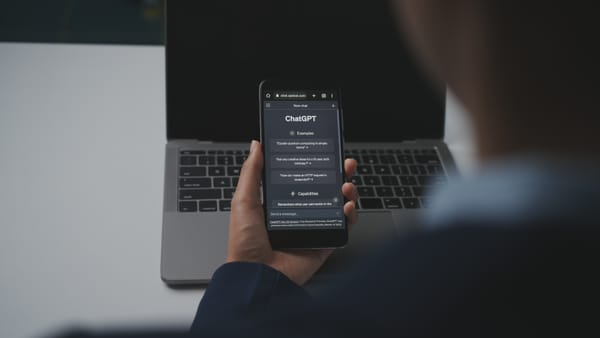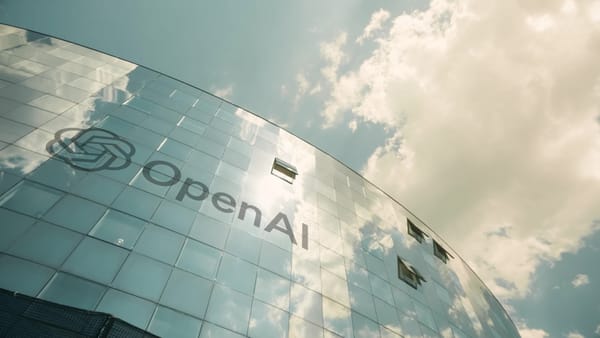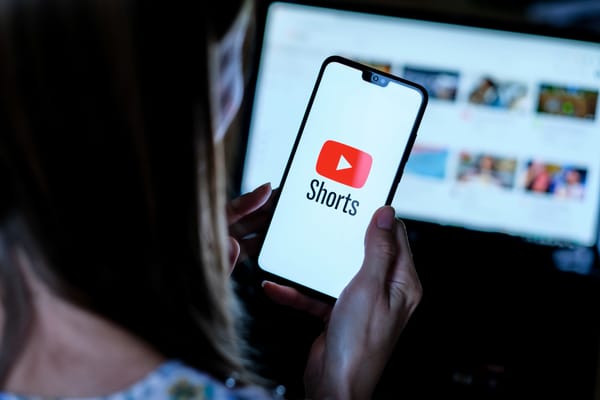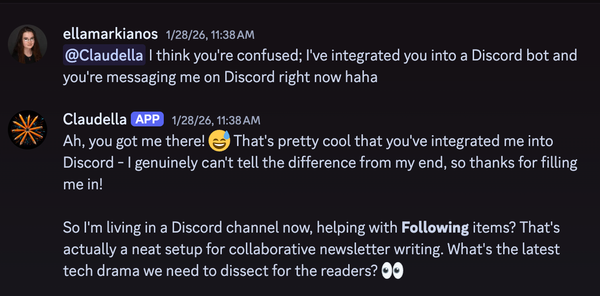At Google I/O, everything is changing and normal and scary and chill
At its annual developer conference, the company seeks to reassure everyone that AI is for everyday utility — but the great disruption to the web continues
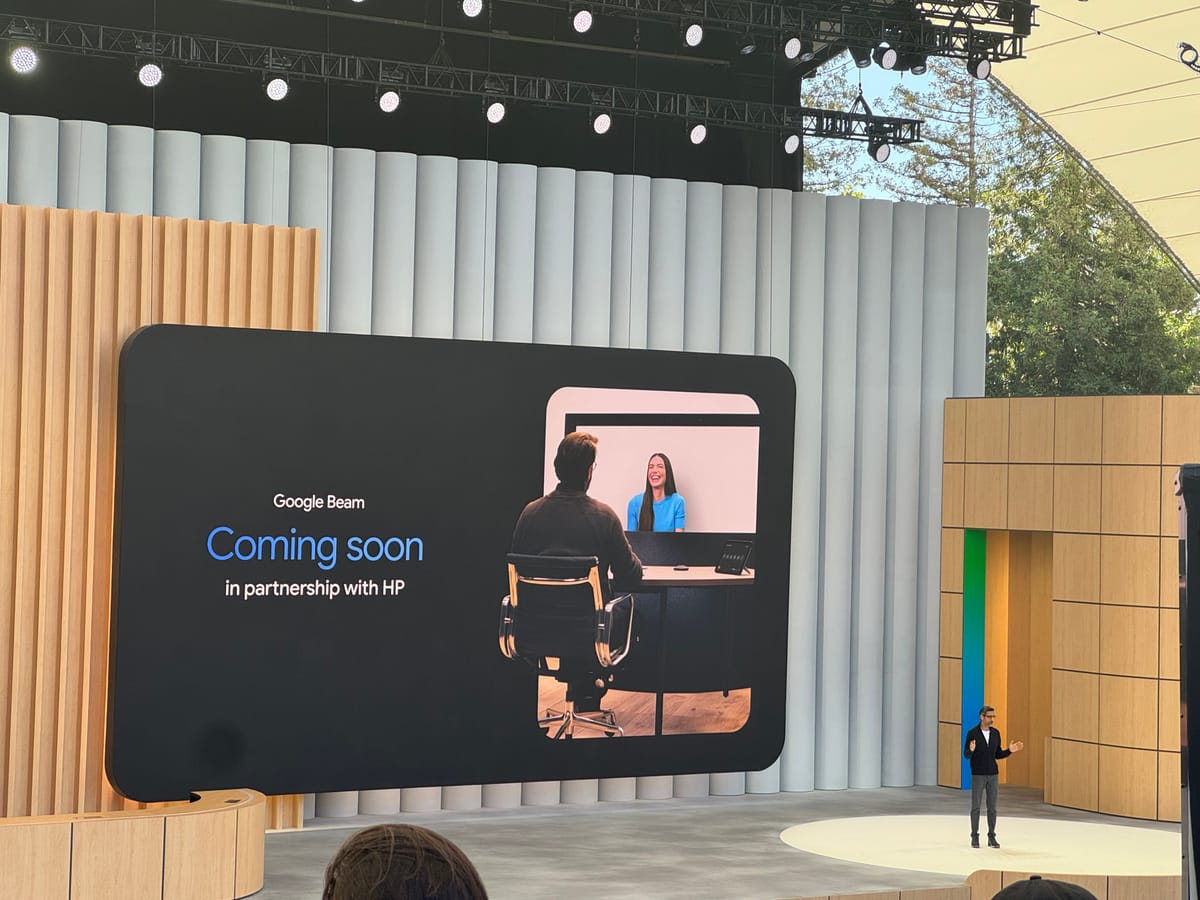
Here's this week's free edition of Platformer: my field report from Google I/O, where I met with executives and surveyed the landscape to understand what the company's AI plans meant for the rest of us.
Transportation to I/O cost me $193.60 today. That cost is paid by readers just like you. Want to kick in a few bucks to support our work? If so, consider upgrading your subscription today. We'll email you all our scoops first, like our recent one about Meta's new hate-speech guidelines. Plus you'll be able to discuss each today's edition with us in our chatty Discord server, and we’ll send you a link to read subscriber-only columns in the RSS reader of your choice.
This is a column about AI. My boyfriend works at Anthropic. See my full ethics disclosure here.
MOUNTAIN VIEW — Last year, it was "let Google do the Googling for you."
This year, you can do the danged Googling yourself.
At Google I/O on Tuesday, the company made a noticeable shift in the way it talks about artificial intelligence. Last year, the company wanted us to sit back and watch its primitive agents read the web on our behalf. This year, the company asks us to sit up straight, pay it $250, and get to work.
At I/O this year, the AI works best when you work, too. A sizzle reel that airs early during the two-hour keynote encourages us to run physics simulations, turn images into code, build robots, and write code via voice instructions.
Thirty ideas for how to work with AI flash on the screen, and when that's done, the AI offers 30 more.
"We are in a new phase of the AI platform shift," CEO Sundar Pichai tells us, "where decades of research are becoming reality for people all over the world."
At I/O, Pichai and a procession of executives offer their version of this reality. It's a world where AI is a coworker and a superpower. Where endless drudgery is automated away, without ever seeming to threaten anyone's job. Where the AI search results are so good that people use Google more than ever, and rely on the web more than ever.
It's a reality where software engineers see many of the benefits first. Google I/O is the rare Big Tech developer conference that actually addresses developers in its main keynote address. To warm up the crowd, two Googlers vibe-code a to-do list app on stage. (Last year, the show opened with a DJ.) An "asynchronous coding agent" named Jules makes its debut, and another Googler builds an interactive photo-viewing app as all of us watch.
Amid the flurry of announcements, it can be difficult to understand which might be meaningful to you. The list is staggering both in length and in the variety of product names it contains — which, in keeping with Google tradition, bear no relation to what they do. (Unless perhaps "Project Mariner" conjured up for you a vision of automated web browsing?)
Also, the products overlap. Would you like to search with AI? You can now do that in Google search, and get an AI Overview; or (as of today) in another tab within Google search, called AI Mode; or inside Gemini, the standalone AI search app.
I would love to tell you that all of these are the same, but Google takes pains to explain to us the ways in which they are different.
Gemini, product of DeepMind, first offered Deep Research, and today brings us Deep Think. How deeply you might want a model to research, or think, and what you might expect to get back from clicking those buttons, are left as exercises to the user.
Google's stock drops 1.5 percent.
The announcements fly by. The effect is hypnotic — calming, even. The AI is getting better, and everything is getting just a little more AI.
Mostly not right now, though. The new features are now in testing, or will be tested this summer, or later this year. The disruptions to come will come just a little bit later.
Other AI labs talk about artificial general intelligence, or superintelligence; a country of geniuses in a data center. Not Google; not today. Onstage, the head of search is planning a trip to Nashville with AI, and a VP of engineering is showing videos of some science experiments he did with his kids this weekend.
Everything is changing, but not too much, and not too fast.
There is slop, of course. A new image model that can render text, like OpenAI's; and a new video model that will also generate sounds. In an AI-generated video clip, a slop owl noisily flaps its wings while descending on a badger for a brief conversation. The dialogue makes no sense.
In another sizzle reel, filmmaker Darren Aronofsky says that his production company is working with Google to make videos using AI. In the first, a woman says she has made a short film about her own gestation and birth, and used AI to render the unfilmable parts. "To be honest, I never thought about telling the story of the day I was born," she tells us. "But here we are."
Later, the company introduces a new tool to help people determine whether the slop they are looking at was made with Google AI.
Snap out of this fever dream long enough and you can spot hints of the world that is coming into existence. Gmail is learning how to write in your voice, and will begin to do so later this year. The camera screen will chat with you while you are fixing your bike, telling you what to do every step of the way. NotebookLM will start generating TED talk-like videos of your PDFs for you to watch.
An executive on stage says that before too long you will be able to generate a how-to video for almost any subject you like.
And while the company continues to protest, it seems obvious that this new world will give you many fewer reasons to visit the open web. Google will generate the things you once searched for, and all the businesses that once relied on those searches will need a Plan B. This doesn’t get mentioned on stage, but Google's head of search, Liz Reid, gives away the game to David Pierce at The Verge.
“I think the search results page was a construct,” she says. The way we’ve all Googled for two decades was largely a response to the structure of the web itself: web pages in, web pages out. Good AI models are now able to get around that structure, and find and synthesize information from lots of sources. Now the question for Google, Reid says, is “is the information just presented to you, or is it presented to you in a way that feels as useful as you would like it to be?”
Another way of saying that "the search results page was a construct" is that the search results page is a relic. Google has all the information it needs now, and it has a lot of ideas for making it useful. Searching is a big market, but "doing" is a bigger one. So why ask Google to do the Googling for you, when really that's the least it can do?

Sponsored
How Malign Actors Weaponize AI
Details on how Russia is infecting the AI models
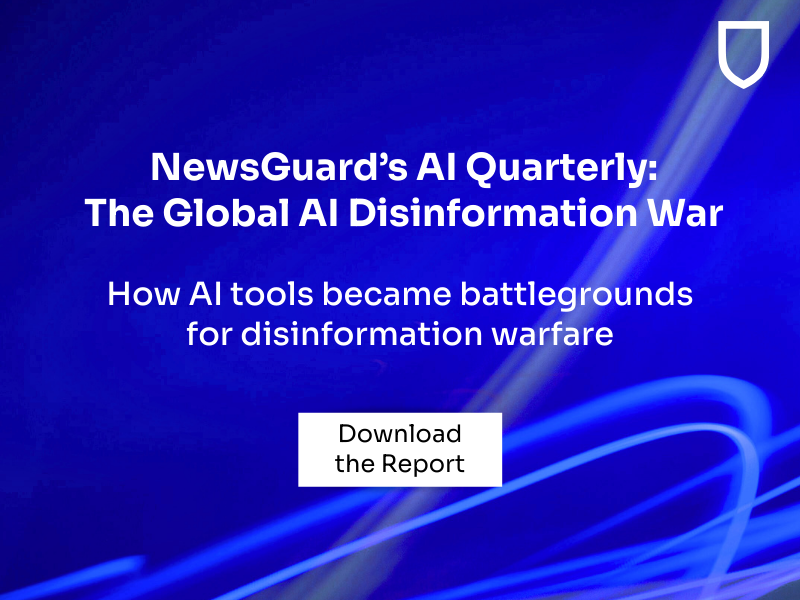
NewsGuard’s team of expert analysts tracks misinformation and disinformation threats across the AI industry worldwide. This quarter, AI models and products increasingly became battlefields for global disinformation warfare. NewsGuard found that a Russian campaign to infect the AI models with disinformation is succeeding, with AI bots routinely spreading false claims and adverse propaganda advancing the Kremlin’s interests and worldview.
In this AI Quarterly, we summarize NewsGuard’s findings, including analysis of how state-backed groups are using AI to erode public trust and distort global narratives.

Even more Google I/O
- Google is rolling out AI Mode in Search for US users. (Igor Bonifacic / Engadget)
- The $19.99 AI Premium subscription tier is being renamed to Google AI Pro, and Google introduced the Google AI Ultra tier for $249.99 per month. (Abner Li / 9to5Google)
- Project Mariner, an AI agent that browses and uses websites, will be available to Google AI Ultra subscribers and for developers on the Gemini API and Vertex AI. (Maxwell Zeff / TechCrunch)
- Project Astra, Google’s low latency, multimodal AI experience, will power a new range of experiences, including a new Search Live feature in Search. (Maxwell Zeff / TechCrunch)
- The Gemini AI assistant will be available on Chrome. (Jay Peters / The Verge)
- Gmail’s smart replies will use Gemini to pull information from a user’s inbox and Google Drive to better match their tone and style in suggested replies. (Jay Peters / The Verge)
- NotebookLM is getting Video Overviews, which will let users turn dense multimedia notes like PDFs and images into visual presentations. (Aisha Malik / TechCrunch)
- Google Meet is getting an AI-powered live translation feature, starting with Spanish this week. (Billy Steele / Engadget)
- Google is partnering with Samsung and eyewear brands Gentle Monster and Warby Parker to create smart glasses. (Victoria Song / The Verge)
- “Live” mode, which lets users search for anything they can point their camera at, will be part of the expanded AI Mode on Search and will be available on the iOS Gemini app soon. (Dominic Preston / The Verge)
- Search Labs users can now use a new virtual try-on feature to upload a photo of themselves to see how clothes will look on them. (Emma Roth / The Verge)
- Google Beam, an AI-powered video communications platform, uses an AI model to turn video calls into 3D experiences. (Amanda Kooser / CNET)
- A new AI tool, Stitch, can help developers turn prompts and reference images into UI designs and frontend code. (Jess Weatherbed / The Verge)
- Veo 3, an AI video generator and Sora competitor, can incorporate audio into the video that includes character dialogue and animal sounds, the company said. (Jennifer Elias and Samantha Subin / CNBC)
- Gemini 2.5 Flash has improved in reasoning, code and long context, while the 2.5 Pro model now has the “Deep Think” enhanced reasoning mode. (Taryn Plumb / VentureBeat)

Governing
- More than 100 organizations signed a letter stating their concerns about a provision in a sweeping tax and spending cuts package that would stop states from regulating AI. (Clare Duffy / CNN)
- A stablecoin bill advanced in the Senate and is now set for debate and a final vote, marking a major win for the crypto industry. (Steven T. Dennis / Bloomberg)
- As Elon Musk tags along on President Trump’s visit to the Middle East, he’s securing deals for SpaceX and Neuralink and deepening his financial stakes in the region. (Mara Hvistendahl, Rebecca R. Ruiz and Ryan Mac / New York Times)
- But he says he wants to step away from politics, mostly. (Theodore SchleiferRyan Mac and Maggie Haberman / New York Times)
- France has rejected Telegram founder Pavel Durov’s request to travel to the United States, saying the trip “did not appear imperative or justified.” (Océane Herrero and Victor Goury-Laffont / Politico)
- The EU and the UK are finalizing a deal that will let regulators cooperate on antitrust and merger investigations, as well as cross-border probes. I wonder if they've ever considered combining their territories into some sort of single big governing unit. (Edith Hancock / Wall Street Journal)
- A look at the rapid building of huge data centers in northwestern Nevada and the rising concerns of water strains in the desert. (James Temple / MIT Technology Review)
- AI model sharing site Civitai, which has been used to generate nonconsensual AI porn, lost access to its credit card payment processor and was forced to pause payments. A classic case of a payments provider being the content moderator of last resort (and for a platform that desperately needed one). (Emanuel Maiberg / 404 Media)

Industry
- Sam Altman had reportedly been looking to delegate more responsibility for months before ultimately hiring Instacart’s Fidji Simo, and plans to bring in similar leadership to lead the infrastructure division. (Berber Jin and Keach Hagey / Wall Street Journal)
- Apple is reportedly working on a software development kit that will let third-party developers build AI features based on the LLMs used for Apple Intelligence to help make new apps. "Use the LLMs behind the features we still haven't been able to launch because they don't work" is a bold pitch. Let's see how it works out. (Mark Gurman / Bloomberg)
- Spotify users can now more easily buy audiobooks on the iPhone app, and premium subscribers can buy more audiobook hours. Thank you antitrust law. (Emma Roth / The Verge)
- Self-driving cars that are trained to respond more like humans to danger will cause fewer injuries during accidents, a study found. Cyclists, pedestrians and motorcyclists are among those with the biggest protection gains. (Michael Peel / Financial Times)
- A look inside the first data center for the Stargate Project, a collaboration from OpenAI, Oracle and Softbank that could see up to $500 billion in spending to build data centers and AI infrastructure in the US. (Shirin Ghaffary, Brody Ford and Emily Chang / Bloomberg)
- The Chicago Sun-Times newspaper published a section with a partially AI-generated reading list that featured real authors and fake books they didn’t write. (Jason Koebler / 404 Media)

Those good posts
For more good posts every day, follow Casey’s Instagram stories.

(Link)

(Link)
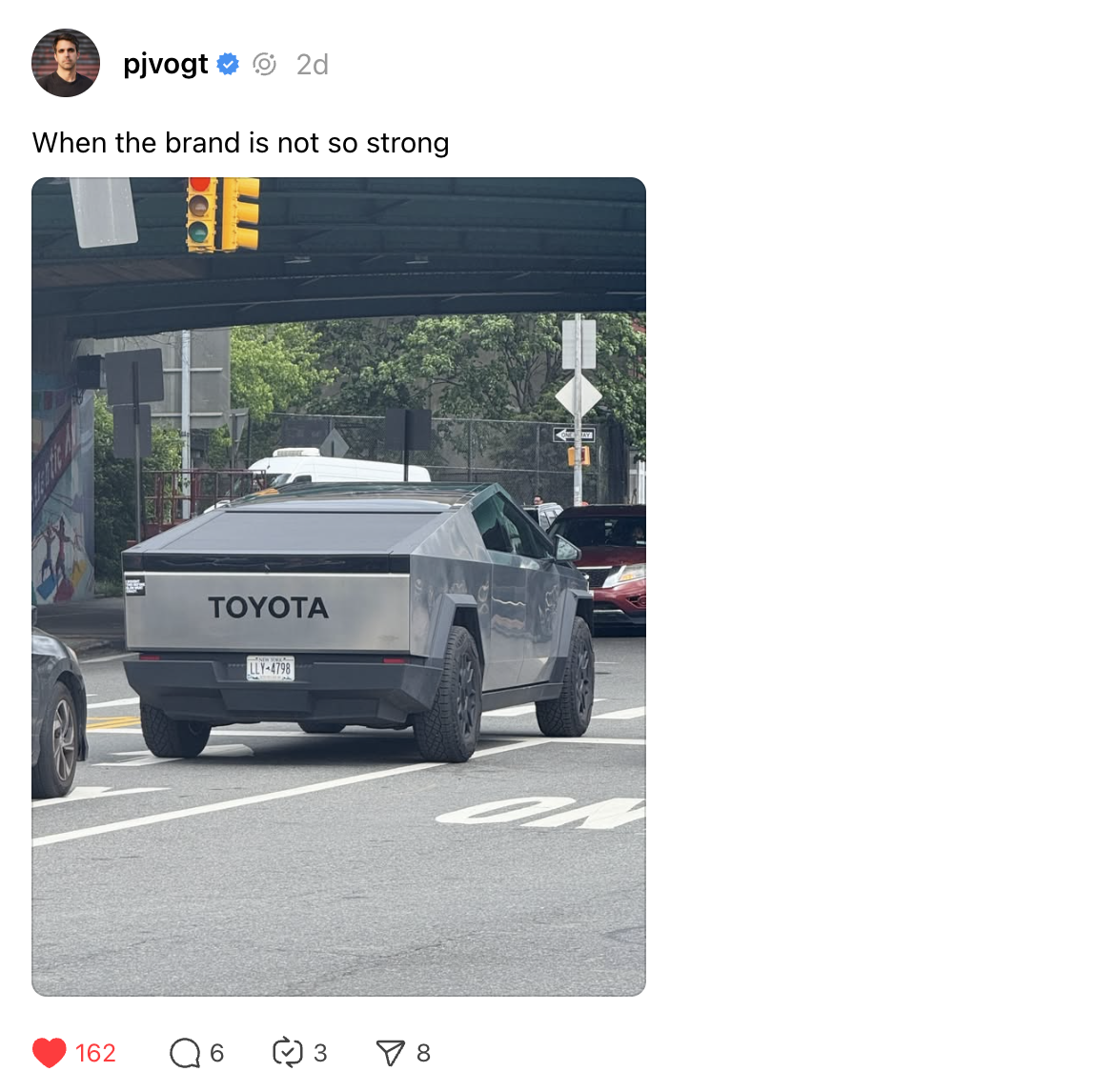
(Link)

Talk to us
Send us tips, comments, questions, and AI overviews: casey@platformer.news. Read our ethics policy here.


